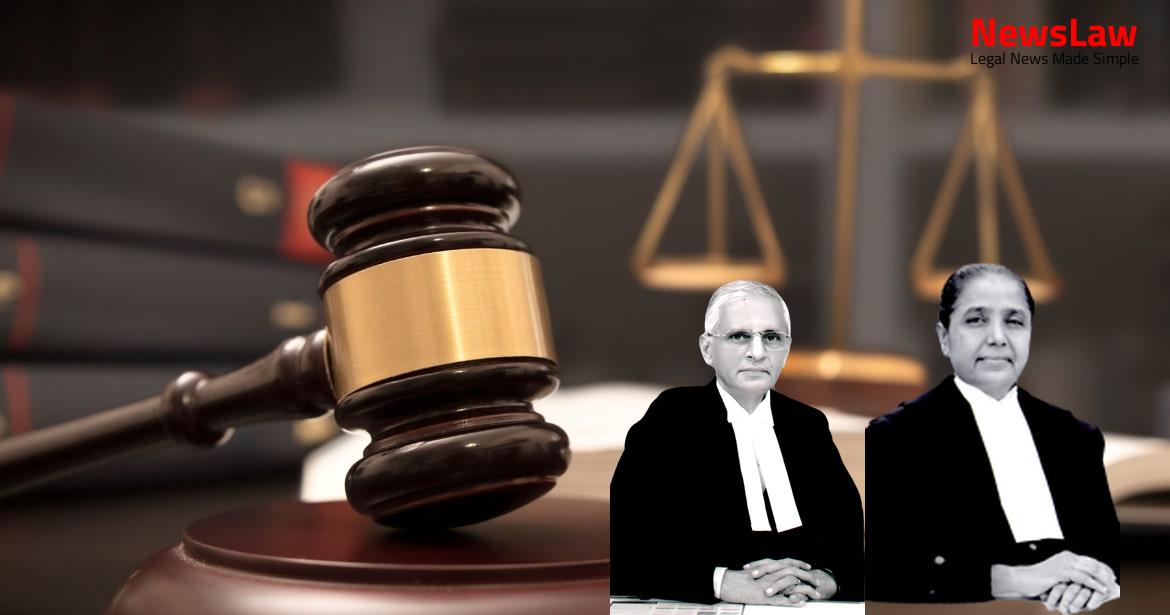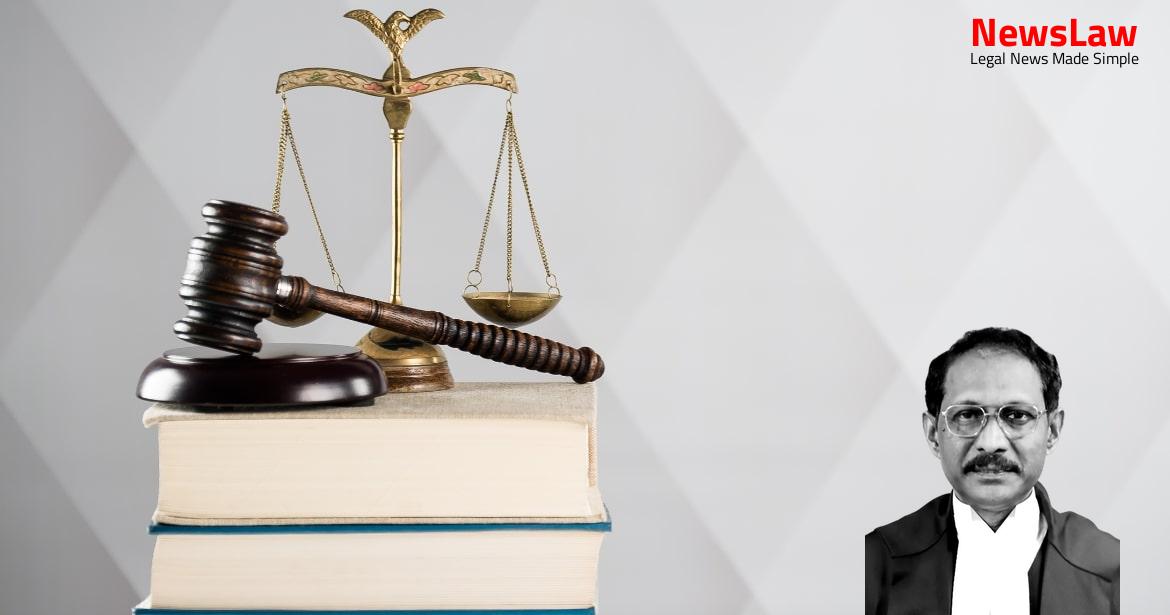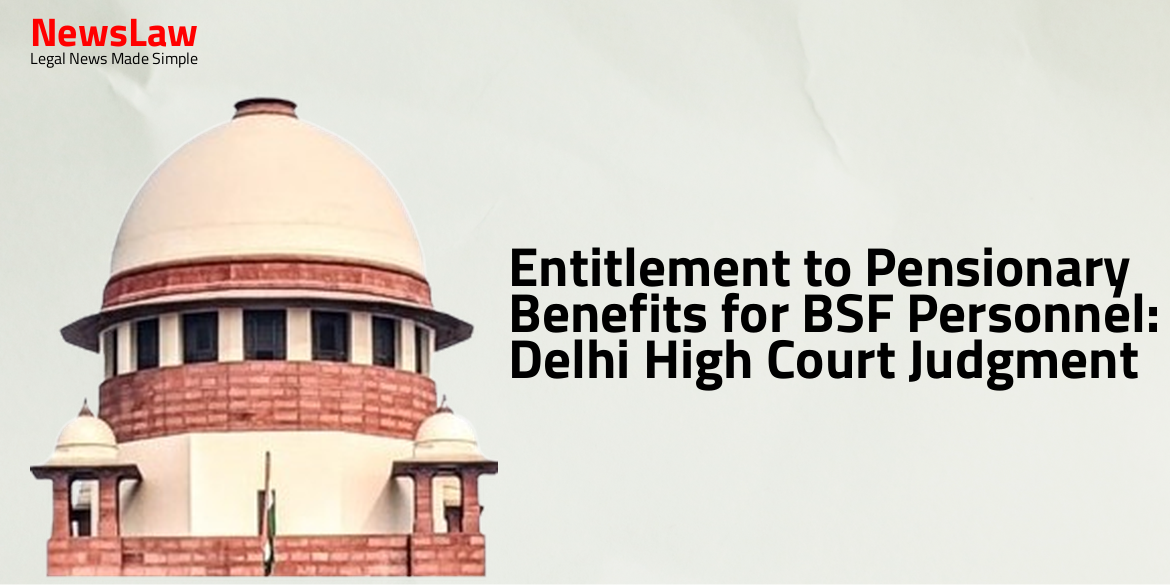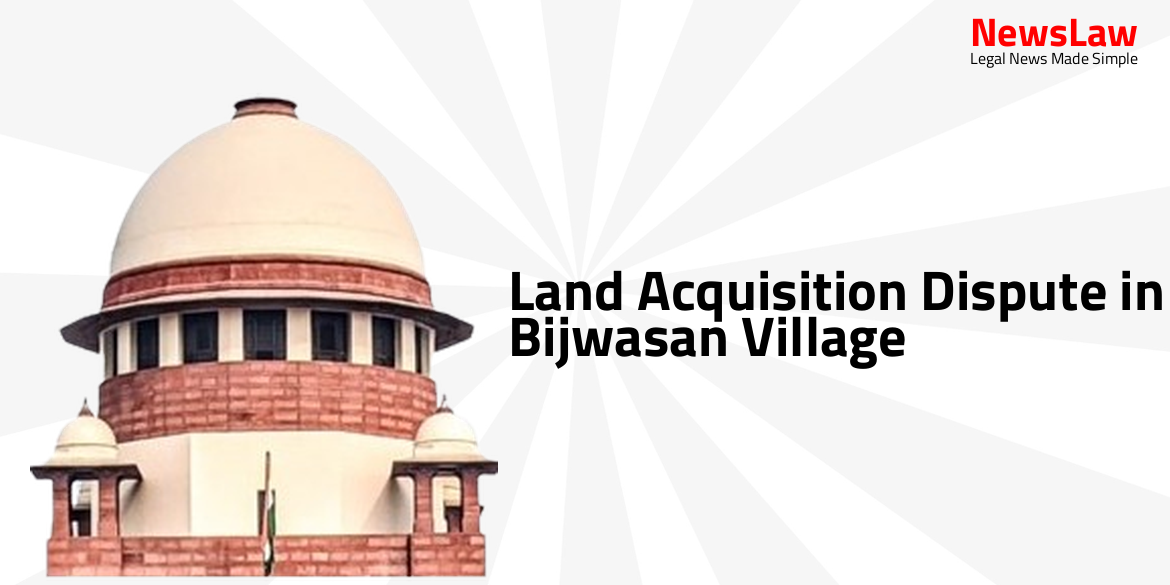Delve into the complex legal analysis undertaken by the court in a jurisdictional dispute pertaining to recovery proceedings involving public sector entities. The case revolves around the differentiation of liabilities pre and post-takeover, with a keen focus on the interpretation of laws governing such disputes. Through a thorough examination of the court’s findings, a deeper understanding of the legal principles at play emerges, shedding light on the intricacies of corporate litigation.
Facts
- Respondent No.1 filed a writ petition challenging the jurisdiction of the Arbitrator to proceed further with the matter.
- The Appellant sought recovery of a balance sum from Respondent No.1 and Shree Sitaram Mills Ltd.
- The Government of India issued an Office Memorandum for settlement of commercial disputes between Public Sector Enterprises and Government Departments through Permanent Machinery of Arbitrators.
- The Appellant filed a recovery suit against Respondent No.1, which was transferred to the Debts Recovery Tribunal.
- The Commissioner of Payment allowed a part of the claim under the Textile Undertakings (Nationalisation) Act.
- NTC raised objections to the maintainability of the arbitral proceedings in response to a notice dated 17.10.2011.
- The Division Bench allowed the appeal and overturned the decision of the learned Single Judge of the High Court.
- The Division Bench stated that the Respondent No. 1 cannot be held liable for the arbitration proceedings before PMA for recovery.
- The Committee of Disputes (COD) formed based on Supreme Court judgments was reversed by a subsequent judgment in the case of Electronics Corporation of India Ltd.
- The Arbitral Tribunal directed the parties to submit documents or evidence in support of their claims and counterclaims.
- It was clarified that the liability for claims lodged before PMA prior to the appointed day is not of Respondent No.1.
- The appellant’s claim before the Commissioner of Payments admitted the liability for claims to be of the earlier owner company.
- The Division Bench set aside the Single Judge’s order, quashed the Arbitral Tribunal’s notice, and decided against the appellant regarding liability.
- The Division Bench clarified the difference between ‘textile undertaking’ and ‘textile company’ regarding the takeover of Shree Sitaram Mills Ltd.
Also Read: Liability for Employee Actions in Contractual Disputes
Arguments
- The appellant argues that the High Court overlooked the Office Memorandum dated 22.1.2004, which outlines the mechanism of PMA and has not been invalidated by the Supreme Court.
- The appellant asserts that the case law cited pertains to the abolition of the High-Powered Committee on disputes and not the PMA.
- It is contended that the arbitral forum was set up in accordance with the Supreme Court’s mandate in ONGC vs. Collector of Central Excise, before it was recalled by the Apex Court in a subsequent case.
- The Office Memorandum dated 22.1.2004 is considered an executive decision by the Government of India and is not subject to judicial review.
- The appellant bank, being a public sector bank, faces financial challenges with proceedings stalled due to adjournments and a rejected claim by the Commissioner of Payments.
- The liability in question originated from M/s Shri Sitaram Mills Ltd., which was taken over by the respondents, leading to the current claim for liquidation.
- The judgment to quash the arbitral proceedings is seen as hampering the bank’s recovery efforts.
- The respondent contends that Shree Sitaram Mills Ltd. was not nationalized and only their textile undertaking, Sitaram Mills, was.
- The appellant’s claim falls under the jurisdiction of the Textile Undertakings (Nationalisation) Act, 1995, and thus their appeal should have been directed to the principal civil court of original jurisdiction.
- Appellant is accused of forum shopping and has approached various courts/tribunals.
- Contentions regarding liability and dispute between appellant Bank and respondents – Union of India and National Textile Corporation.
- Discussion on appropriate forum for adjudication of liabilities and mode of recovery.
- Additional Solicitor General argues that the Office Memorandum providing the forum is not applicable in the present case due to disputed liability of respondent No.1.
- Contention that the dispute is over the liability of respondent No.1 as only the Textile Mill is taken over, making the mechanism for claims between two Public Sector Enterprises inapplicable.
- Arbitration proceedings initiated by the appellant before the PMA based on both parties being Central Public Sector establishments governed by the Office Memorandum dated 22.01.2004.
Also Read: Supreme Court Upholds Rejection of Plaint Under Order VII Rule 11 of CPC: A Critical Analysis
Analysis
- The High Court did not consider that after the takeover in 1983 and nationalisation of the owner company, the rights and liabilities were vested in Respondent No.1.
- Respondent No.1 argues that liabilities before nationalisation cannot be enforced against them.
- The dispute revolves around the distinction between Shree Sitaram Mills and Shree Sitaram Mills Ltd., leading to a contested liability.
- The recovery proceedings were initially against Shree Sitaram Mills Ltd., later involving Respondent No.1 due to the takeover.
- The Division Bench’s conclusion that Respondent No.1 is not liable for the dues of Shree Sitaram Mills Ltd. is debated.
- The matter of liabilities post-takeover, secured assets, and the role of Union of India as a guarantor need further examination in recovery proceedings.
- The PMA was invoked due to the nature of the parties involved as public sector entities, as per the Office Memorandum.
- The Division Bench was justified in quashing the arbitral proceedings, but the liability question needs to be addressed in the recovery proceedings.
- Division Bench referred to the decision of the High Court of Madras and the High Court of Allahabad to hold that liability does not transfer on takeover for Provident Fund dues.
- Subsequent observations in Electronics Corporation India Ltd. vs Union of India & Ors. noted that the mechanism suggested had outlived its utility and a Committee on Disputes (COD) was constituted.
- The COD was formed to examine claims being put forth in disputes.
- An Administrative Mechanism for Resolution of CPSEs Disputes (AMRCD) was introduced through an Office Memorandum dated 22.05.2018, similar to the consideration made by PMA.
- Decision to set aside impugned judgment in LPA No.808/2012 quashing notice dated 17.10.2011 of the Arbitral Tribunal under PMA.
- No interference warranted in quashing the said notice.
- Division Bench’s conclusion that respondents are not liable for the amount claimed by the appellant is set aside.
- Conclusion should not have been recorded in favor of respondents.
Also Read: Validity of Debt and Enforcement of Section 138 NI Act
Decision
- The appellant is permitted to bring on record the respondents in the recovery proceedings
- The recovery proceedings shall be revived and taken towards its logical conclusion in accordance with the law
- The post take-over claim in O.A.No.1114/2000 is pending before the DRT in Mumbai and is adjourned sine die, leaving the question of liability and recovery to be decided by the appropriate forum
- The disposal of SLP (Civil) No.20527/2014 in view of the judgment passed in Civil Appeal arising out of SLP (Civil) No.15914 of 2014
- The Appeal DRTA No.271/2005 filed in the DRT in Mumbai regarding the rejection of the claim against defendant Nos. 3 (a to c), with respondents reserved liberty to oppose and a decision to be made by the Recovery Officer/Presiding Officer independently
- All pending applications to be disposed of and all contentions of the parties left open
Case Title: UCO BANK Vs. NATIONAL TEXTILE CORPORATION LTD. (2020 INSC 282)
Case Number: C.A. No.-002046-002046 / 2020



